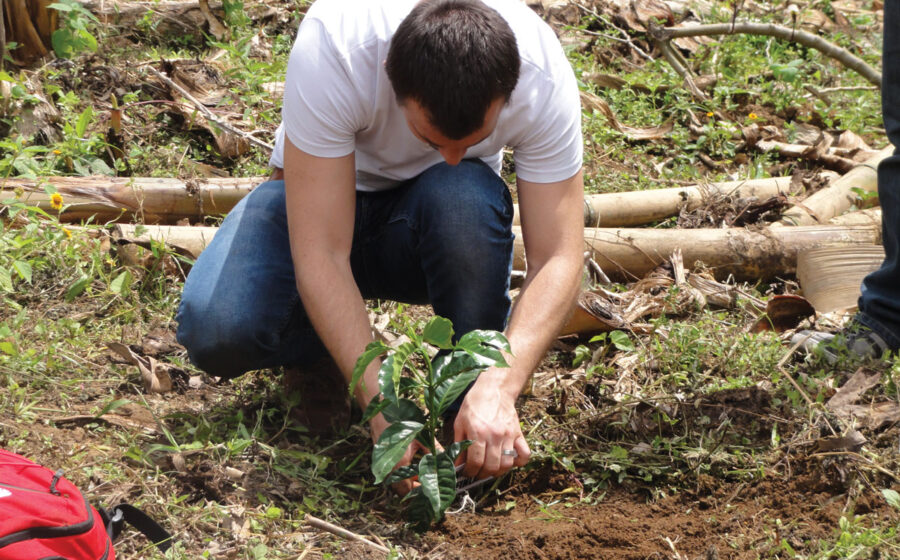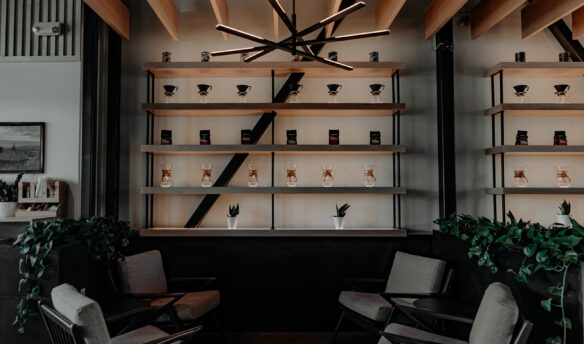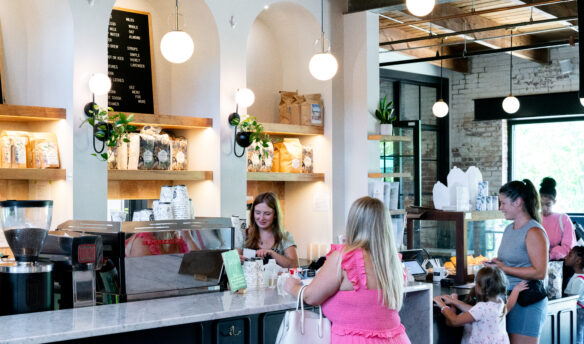[A]nn Campion had an exceptionally hard and fast crash course in coffee. Just after her fiftieth birthday she bought a local coffeehouse called Revel Caffe. It was her first business and she’d never worked in coffee. Immediately after the purchase, she took a Pacific Coast Highway trip that became a master class of third-wave coffee, taught by baristas from more than twenty of the West Coast’s best cafés. Then she went back to Stratford, Ontario, to learn how to use her espresso machine.
That year was pure education. But even with everything she learned, her trip to origin at the end of her first year in the coffee business taught her exponentially more.

Ann traveled to the Nicaraguan coffee farm owned by her roaster’s family. Arriving at the farm after dark, Ann, her roaster, and her roaster’s youngest daughter had to walk up a mountainside to the farmhouse. Midway up the climb, they reached a drying bed filled with green beans. The young girl said they needed to make coffee angels. Bemused, Ann was brought among the beans and encouraged to lie down and wave her arms and legs, brushing out an angel. The smells of the beans were intoxicating, rich with aromas she’d never associated with coffee. “It was like lying in honey,” she says.
For the next several days she had origin-trip experiences of a more standard type, but each revealed aspects of coffee she could never encounter back home in Canada. “I didn’t understand what it meant to pick by hand,” she says. “It’s life altering. You don’t waste a bean, even a roasted bean. Those connections make everything more important.”
She had a greater understanding of the beans, and maybe in some intangible ways that made her a better barista, but more than that she had deeper respect for what it took to bring her those beans. “The biggest thing for me everyday is to serve my coffee with a sense of gratitude for the people who brought it to me,” she says. That trip in 2012 has been a catalyst of her success and a driver of her ongoing coffee education.
Visits to origin used to be the realm of importers alone because there was just no obvious reason for anyone else to go. Then head roasters, even from small operations, began to make treks around the world, turning direct-trade into a hallmark of third-wave. Origin trips are so common now it’s hard to track down master roasters during harvest months. They’re usually bouncing around Central America, maybe even Africa. At many shops, travel budgets have been set for the rest of a roasting team and sometimes even baristas.
As the stories about coffee become more important to cafés and roasteries, it behooves owners to provide themselves and their staff with closer connections to the people, places, and processes that make up the story of a cup of coffee. A major obstacle to persuading customers to pony up for direct-trade coffee is the difficulty many have understanding why it’s more expensive, and sometimes taste alone isn’t persuasive. Stories bridge that gap, but a story is only as good as the telling. While it’s nice when a barista can say where a coffee came from, it’s something entirely winning when that barista can tell her story about being at this coffee’s farm.
“There’s a lot of value in having a well-trained team who has a sophisticated understanding for what we’re doing, not just one side of it.” —Joel Pollock
For roasters, a trip to origin provides an invaluable insight into how different process affect green beans, giving a deeper understanding into the final profile of a roast. Joel Pollock, the owner of Panther Coffee in Miami, says a trip to origin can turn abstract ideas like natural or washed process into something tangible and nuanced. “There are so many different ways to process coffee that the few phrases we use to describe the processes don’t really show how varied they can be,” he says.
Joel had roasted coffee for more than a decade before making his first origin trip and he says, “It was the first time my eyes were opened as a young coffee roaster.” He started Panther in 2011 after a long stint at Stumptown Coffee Roasters, and taking roasters to origin countries has been a goal from the beginning. “There’s a lot of value in having a well-trained team who has a sophisticated understanding for what we’re doing, not just one side of it,” he says.
During the recent harvest in Nicaragua (it so happens), Joel brought along Michael King, who began as a barista with Panther when it opened and moved to roasting eight months ago. Michael didn’t have a near-spiritual moment like Ann did when she made her coffee angel, but he took away the same respect. “I saw the sheer amount of people it takes to collect all that coffee,” he says. He came back to Miami with “a huge appreciation of their hard work. It’s incredible to see it.”
At one farm Michael cupped forty different coffees, and he’ll roast many of them for the rest of the year. Every time he opens a bag, he’ll reconnect with that farm and everyone who brought the beans to him.
—Cory Eldridge is the editor of Fresh Cup.
—Photos by Chris Ryan.
















